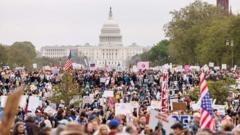Crowds surged in major cities across the United States on Saturday, marking one of the most significant nationwide demonstrations against President Trump since he took office in January. Dubbed the "Hands Off" protests, organizers aimed to host rallies in over 1,200 locations, encompassing all 50 states. Notable turnouts occurred in cities such as Boston, Chicago, Los Angeles, New York, and Washington D.C. Protesters voiced a spectrum of concerns tied to Trump’s policies, which range from economic to social injustices.
The protests stirred up sentiment following Trump's recent announcement regarding import tariffs aimed at many countries. Demonstrations also erupted abroad, with gatherings noted in London, Paris, and Berlin. In Boston, demonstrators expressed particular ire over immigration enforcement actions that have impacted university students, with participants emphasizing their commitment to stand against governmental overreach.
A law student named Katie Smith referenced the recent arrest of Turkish international student Rumeysa Ozturk, captured on video near Tufts University, remarking, “You can stand up today or you can be taken later.”
The situation escalated in London, where protesters wielded signs proclaiming messages like, "Stop hurting people," while others in Washington D.C. listened intently to speeches from Democratic lawmakers. Many of these addresses targeted the influence of affluent individuals, especially Elon Musk, who has been a focal point of criticism regarding his advisory role to Trump, and the proposed austerity measures his administration has pursued.
Congressman Maxwell Frost from Florida articulated concerns around the "billionaire takeover of our government," asserting that when the elite exploit ordinary citizens, those citizens are bound to push back—both at the polls and in the streets.
The protests come on the tail of a politically charged week, following a closely monitored special congressional election in Florida which saw Republican victories but with less favorable outcomes for Trump's party than anticipated. Additionally, a Democratic win in Wisconsin's state supreme court dealt a further blow to Trump's influence, especially considering the poll numbers which show dwindling support for the President.
Recent surveys indicate that Trump’s approval ratings are faltering, with a drop to 43%—the lowest since entering his second term—alongside a mere 30% of Americans approving of his economic strategies. A Harvard Caps/Harris poll also highlighted that nearly half of registered voters believe Trump performs better than his predecessor, Joe Biden, despite an overall decline in approval.
In Washington, protesters made it clear they felt their democratic rights were under threat, with fears over cuts to government services, highlighting a growing unease regarding retirement and education benefits.
Despite the protests, Trump chose to spend the day on the golf course at one of his resorts in Florida, prompting some to question whether he would respond to the messages conveyed by demonstrators. The White House defended Trump's policies, framing him as a staunch protector of Social Security and Medicare, while casting the Democrats as the real threat to these programs.
Advisors in Trump’s camp downplayed the protests, suggesting such gatherings lack real impact. Nevertheless, across various cities, signs of dissent proliferated, with many citizens exhibiting their frustrations through rallies and demonstrations, underscoring the deep divides that continue to characterize American political discourse as the country gears up for future elections.






















